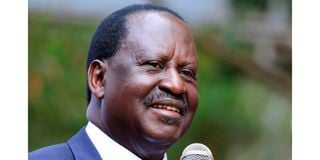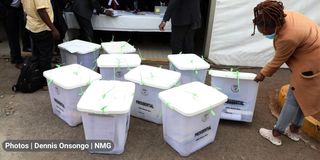Premium
Raila finally gets access to all IEBC servers after standoff

Azimio la Umoja presidential candidate Raila Odinga.
The electoral agency finally granted Azimio leader Raila Odinga access to its servers on Wednesday, coming after his lawyer James Orengo alleged that it had blocked the presidential candidate from doing so despite a court order.
The Supreme Court had on Tuesday ordered the Independent Electoral and Boundaries Commission (IEBC) to give Mr Odinga access to all election servers and ballot boxes from 15 polling stations for inspection, scrutiny and recount of votes. However, a standoff arose today that saw Mr Odinga's team blocked from accessing the servers. Inspection of ballot boxes, however, went on without a hitch.

Judiciary and IEBC staff receive ballot boxes from Mombasa and Nandi counties after the Supreme Court ordered a fresh scrutiny of votes from 15 polling stations from various parts of the country. A report on the vote check will be tabled in court on Thursday.
IEBC and parties disputing the outcome of the presidential vote were locked in a day-long standoff about access to poll servers in a stalemate reminiscent to 2017.
""Members of the court, we are having difficulties with the orders relating to the inspection of the servers. We have been given restricted access only to the results transmission system. It is established that IEBC has eight servers yet we have access to one only," Mr Orengo said in court today.
Scope of access
Mr Paul Mwangi, another lawyer representing the Azimio leader, protested that by 3pm, they had not been granted access to the servers as IEBC was still jittery about the scope of access.
In court, IEBC lawyer Eric Gumbo had raised concern that the commission was cautious about far reaching access that could breach the security of the systems and create a problem if the court were to order a repeat election.
Mr Gumbo had protested that the petitioners wanted to take a forensic image of the server which, in the view of the commission, could compromise the systems.
“It’s not accurate to report that there is no progress. The forensic image would allow access that could compromise the server. This would present a problem in the event the court was to order a repeat election as the commission would not have a system in place,” argued the lawyer.
The judges resolved to await a report from court officials overseeing the process to inform the next course of action.
IEBC, through its official social media handle, confirmed Wednesday evening that it had granted Mr Odinga access.
The petitioners that were to be given access to the servers include Mr Odinga’s running mate Martha Karua, Youth Advocacy for Africa (YAA), Mr Peter Kirika, Mr Khelef Khalifa, Mr George Osewe, Ms Ruth Mumbi and Ms Grace Kamau.
Claims of unauthorised access
The court orders stemmed from their allegations that IEBC’s election technology was deliberately compromised by non-commission staff.
“The information sought is critical to demonstrate that IEBC did not conduct a free, fair, secure, verifiable, accountable and transparent presidential election,” they had told the court.
In court today, Mr Orengo, who is also the Siaya Governor, and Philip Murgor argued that there was evidence of remote access to the IEBC system three days after the voting process ended.
"There was illegal and malicious access of the IEBC system by certain individuals, one of whom was Mr Chebukati's personal assistant," Mr Murgor said.
"The technology deployed by IEBC completely failed the standards of security and transparency. It was manipulated and tainted to the point that the results declared by Mr Chebukati cannot be said to be a demonstration of the true will of the people," he added.
"There was evidence of remote access to the IEBC system three days after the voting process ended. Transmission of numerous forms from a single server contrary to the expectation that the forms would come from several Kiems kits."
Additional reporting by Brian Wasuna






